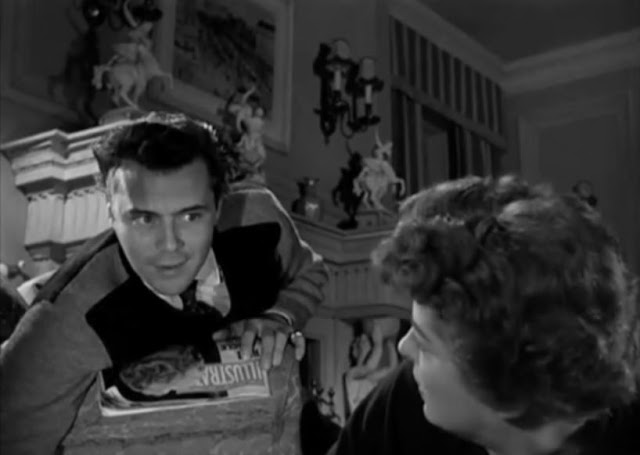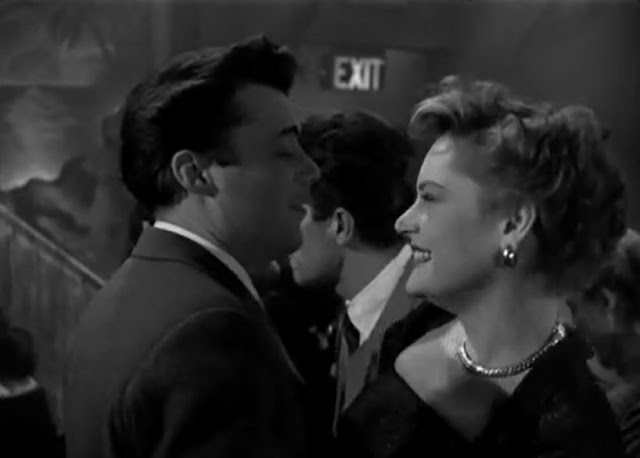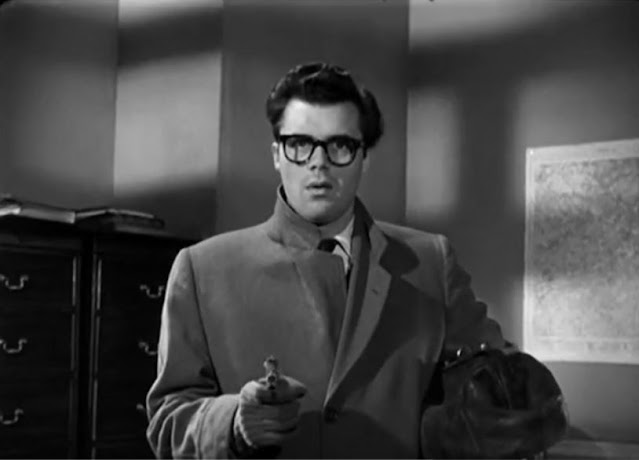The Sleeping Tiger (1954) is a Brit-teen jazz-crime tearaway movie, with stiff upper lip, hot and sexy jazz in Soho, and failed psychanalysis taking place in the midst of an even harder failing marriage.
The subject matter is the mood music of the British time; teenage criminality, the hopeless British stabbing at psychoanalysis; the tragedy of marriage and the family, and the failure of men to control the disastrous environments their misogyny created to begin with.
While Dirk Bogarde's character suffers from an inability to control his criminal teenage urges, his psychiatrist can't control his profession, and is a failure as a husband while obviously believing he is doing the right thing. When he is mansplaingly doing the wrong thing, again and again, while being the lamest husband ever.
And the teenage tearaway Dirk Bogarde is marvellous; his character longs to have actual issues but he is in fact a middle class boy, which makes his random bullying and cigarette puffing anger all the more wild; and how he has the hot-hots for his psychiatrist's moody wife!
There are some regular oddities to British film noir. First there is the fact that the gangsters don’t have the same appeal, and so a lot of British noir focuses on the home, and on marriages, as this one does.
The Sleeping Tiger is film noir insofar as it tackles crime, the root causes of crime, and delves into psychology also. It pulls apart the family, and undermines the criminal and respectable worlds, man-built, man-ruined.
The best scenes in The Sleeping Tiger are definitely those within the hipster night club ― here called The Metro, and populated with swinging rebellious teenagers, and a great jazz band for them to bop to.
There’s edge aplenty, and it genuinely was within these subterranean caverns that the counter cultural movements of the 20th century began.
The Sleeping Tiger seems innocent enough at times, and silly even. But this was the material that Harold Pinter would shortly pathologizing, and which was already breaking out into hip-swaying, Link Wraying teenage living in the US.
Nobody was holding this back, and what you enjoy the most in The Sleeping Tiger is the fact that the adults are out of control. The tools they have at their disposal are rotten: marriage, the law, and psychoanalysis.
They wreck everything.
And what good are they against JAZZ?
The gay abandon of the bored-as-hell married woman was never better expressed than it was when Alexis Smith flung herself to the turf with Dirk Bogarde lain all over her.
And what good are they against director Josef Losey? One of the most superior film noir directors, responsible for - and the subject of - so much high-mid-century paranoia.
Better still, jazz and sex turn to drunken driving, utter abandon at the wheel, and in the absence of any morality, a joy ride out of marriage and into existential erotic freedom - begins!
A moment of regret might be normal, but film noir has done its job: exposed the urges and had them rampant for a few critical moments. The question now becomes just how critical?
The plot summary of The Sleeping Tiger (1954) as derived from
Wikipedia:
Two criminals are stalking the streets of London one dark night. Frank Clemmons (Dirk Bogarde), a cocky middle-class young man, holds up psychiatrist Dr. Clive Esmond (Alexander Knox) at gunpoint outside his affluent home, but Dr. Esmond overpowers him.
Arriving home from in Paris, Dr. Esmond's wife Glenda (Alexis Smith) is taken aback to discover Clemmons staying in their home as the new household guest. To avoid being turned over to the police, Frank agreed to stay as a guest at Dr. Esmond's house as a human guinea-pig subjected to Dr. Esmond's psychoanalysis, which aims to release him from his criminal recidivism. Glenda has reservations about Frank and behaves in a cold, aloof manner towards him.
Frank undergoes regular analysis with Dr. Esmond, who is determined to get to the root of his criminality. In between these sessions, he goes horse riding with Glenda. Although at first indifferent to him, Glenda soon finds herself growing attracted to Frank. With a fellow criminal in tow, Frank leaves the house one night and steals some jewellery. A police inspector later interviews him about the crime, but he denies having committed it. Some time after, Frank takes Glenda to the Metro, a hipster nightclub in Soho where her conflicted attraction to him deepens. The next day Glenda admonishes Frank for his violent behaviour towards the house-maid Sally (Patricia McCarron), but their argument ends with a passionate clinch which indicates the beginning of an affair between Glenda and Frank.
Initially oblivious, Dr. Esmond eventually finds Frank and his wife in a compromising position. Glenda's conflicted feelings plague her. Back at the Metro club with Frank, the two have a huge argument that overwhelms her. As they begin their journey home, Glenda driving recklessly and out of control. A police car soon pursues them but they manage to escape.
Sally's fiancé pays Dr. Esmond a visit to complain about the abuse she has had to endure from Frank. Her fiancé threatens to tell the police about the assault. No charges are pressed and Frank finds out that this is due to Dr. Esmond buying the man off with £100. Frank reacts by carrying out another robbery. When questioned by the police, Dr. Esmond ends up lying on Frank's behalf. A cunning ploy, this results in Frank pouring out a dramatic account of his tyrannical father, whom he deeply despised. As a boy, Frank stole and his father consequently turned him in to the authorities. Frank vowed revenge on his Father when he was released, but was then given a beating. His father died shortly thereafter and his mother blamed him. Frank admits that he prayed for his father's death, and has seen himself as worthy of punishment ever since. Dr. Esmond concludes that with the father's death, Frank has had to provide his own punishment for the rest of his life.
Dr. Esmond soon begins acting like a father figure towards Frank. The two enjoy carefree activities together until Glenda finds out and grows intensely jealous. She asks Frank to elope with her. However, with Dr. Esmond's psychiatric experiment over and his patterns of behaviour understood, Frank leaves and decides to turn himself in to the police. Glenda hysterically rushes to Dr. Esmond, claiming that Frank has assaulted her. Dr. Esmond goes upstairs with a gun and returns claiming that he has shot Frank dead. Glenda is heartbroken and ends up declaring her love for Frank. She then finds out that though there was a gunshot, Frank has escaped and she goes after him in her car. Frank gets into Glenda's car and they drive off at high speed. The highly distressed Glenda swerves to avoid a lorry, but crashes. Frank survives, but Glenda dies in the wreckage.


Once more, film noir will promise full-fright in the dark. That's what we're here for and this is what we love. We also dig
Josef Losey.
Due to his alleged ties with the US Communist Party, the blacklisted Joseph Losey moved to London and began work on The Sleeping Tiger, his first British feature film.
Despite being in England, he faced more problems. The British director Victor Hanbury, who had not directed a film since Hotel Reserve in 1944, allowed Losey to use Hanbury's name as an alias.
The Sleeping Tiger was the beginning of Losey's partnership with Dirk Bogarde, whom he later directed in The Servant, King & Country, Modesty Blaise and Accident; and with editor Reginald Mills who edited The Servant and King & Country.









